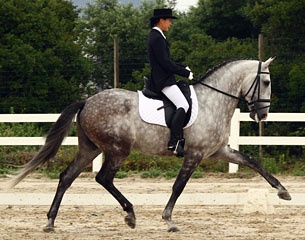
Lately I have been reading many conversations that debate the difference between training and riding an Iberian horse and a warmblood. Common beliefs include that each must be trained in a breed specific way and “what you do with a warmblood, you should not do with an Iberian horse, and vice versa."
One particularly interesting discussion recently stated that Iberians don’t stretch or can’t stretch, as for them stretching just puts them on the forehand. Other leymen comments include that Iberians naturally do piaffe and passage, while warmbloods are better at extended walk, trot and canter.
Having grown up riding warmbloods, I moved to Portugal in 2000 and at that point had never ridden a Lusitano nor Iberian horse in my life. While I found some truths in many breed assumptions, I also saw many very generalised views that if applied to each and every horse would certainly cause some major training and riding problems.
Breeding for Dressage
Belgian trainer Jan Bemelmans, who was Spain's national dressage team trainer for 16 years, has trained and ridden both Iberian and warmblood horses at Grand Prix level and says the major difference between the two horses is where they grow up.
“They all have four legs and they are horses, it’s just that many of the Iberians are bred with another goal in mind,” Bemelmans stated. “For the Iberian breeders it is important how they look, they like them short, uphill, with quick movement and good knee action.”
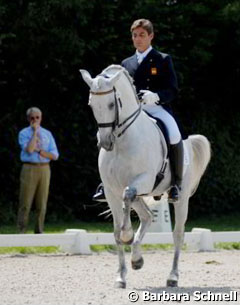 With regular warmblood breeding, Jan states, a discipline is chosen and those horses are bred more particularly for dressage, jumping and cross country. On the contrary with Iberian horses dressage talent is more pure luck. “The breeders were not really breeding for dressage competition so many of those horses miss long movements in the trot and walk," said Jan.
With regular warmblood breeding, Jan states, a discipline is chosen and those horses are bred more particularly for dressage, jumping and cross country. On the contrary with Iberian horses dressage talent is more pure luck. “The breeders were not really breeding for dressage competition so many of those horses miss long movements in the trot and walk," said Jan.
While Iberian breeders are now moving to breeding with more focus on sport and length in the gaits, Jan believes that the key strength with the Iberians is their mind.
“Iberian horses are more willing. One day I saw around 15 Iberian stallions standing right along side each other without any problem," he said. However, in terms of the training, Jan cannot pin point a major difference, as it is always a new journey with each and every horse. “Iberian horses are more talented in piaffe, passage, and pirouettes, because they are built more compact. The history of their breeding was to breed a quick and flexible horse to be successful in army battle and many are still bred for the bullfight today.”
Putting Iberian Power into Practice
Portuguese champion Boaventura Freire and his uncle Vasco Freire, have been breeding warmbloods and Lusitanos for over 20 years, and also experimenting with mixing the two together.
“The main differences in the breeds are that warmbloods are typically bigger horses with strong characters and bigger movement. They have a lot of natural swing and power in their back. If you try to limit them you will normally get a big, strong, swinging, boring into the hand horse," said Freire. "So to train a warmblood a rider should be able to be a sports rider, as these horses have to be moved forward with energy, elasticity and straightness! They are sport horses if you look at the body."
To Freire Lusitanos are a smart, active, motivated horse to work with, but a good horse is a good horse, no matter what breed.
"Lusitanos are not so strong in their body, but that is normally cancelled out by their ability to achieve the highest exercises of the Grand Prix," Freire explained. "Once you show a Lusitano what you want from him in a correct way, he will do it for the rest of is life if you ask him again!”
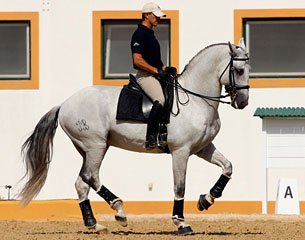 Kyra Kyrkland agrees that a good horse is a good horse and the focus should not be on the breed, but on having three good gaits, a conformation that allows them to collect and extend easily, and a good temperament.
Kyra Kyrkland agrees that a good horse is a good horse and the focus should not be on the breed, but on having three good gaits, a conformation that allows them to collect and extend easily, and a good temperament.
“In general Iberian horses are a bit more sensitive and forward going than Warmbloods,” Kyra added.
Kyrklund also does not think the training requires any particular differences according to breed. When the feeling is good it will be very similar on both, if they are good horses.
Classical trainer Anja Beran wrote on the topic in her book “In Deference”, stating that “the prejudiced opinion that Iberian horses can learn the piaffe better and more easily than the German Warmblood is something which I certainly cannot confirm on the basis of my practical experience. On the contrary, the Andalusian and Lusitanos usually have weaker haunches and a less stable back than our modern sport horse. Just as much effort is therefore required in training the piaffe as is the case with all other horses and it is most certainly not, as is so frequently heard, an ability which is simply innate in the horse. The only good thing which is innate in the Iberian horse is a good supple foreleg. The warmblood has more power, usually stronger haunches and a good back. It is further more considerably straighter.”
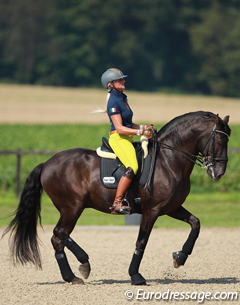 Riding a Grand Prix test after only eight days getting used to her first ever Iberian horse, Italy’s Silvia Rizzo says her feeling and experience is that the Iberian horses are always really cooperative and very balanced in their brain so they are easier to ride.
Riding a Grand Prix test after only eight days getting used to her first ever Iberian horse, Italy’s Silvia Rizzo says her feeling and experience is that the Iberian horses are always really cooperative and very balanced in their brain so they are easier to ride.
"Honestly the two breeds are very different In my opinion," Rizzo stated. "The Iberian horses are lighter, they don't need any kind of force and this make them rideable for girls, even if they are stallions. With Sal I could feel sure and safe in the exercises thanks to his character and his always positive way to correct my mistakes."
Rizzo admitted that she did have to get used to the different gait articulation of the Iberian, especially in canter. "The only difficult part to understand for me is their canter because as they are naturally collected it's easier to make a pirouette than to keep a good tempo in the normal collected canter," she said.
Experiencing the Iberian First Hand
In my own experience I did notice a difference when I first arrived in Portugal. In general the horses were quick as opposed to loose, tense as opposed to boisterous. I found that they were more sensitive to rider tension, mentally and physically. I found that if a rider used too much physical strength on a warmblood they would fight against it, whereas a Lusitano would wind themselves up like a toy mouse and usually just piaffe uncontrollably on the spot.
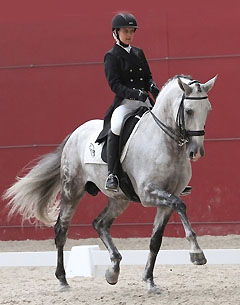 Perhaps it is their natural and very easily triggered inner excited energy that, if harnessed and asked for with calmness and not through force, enables the Iberian horse to piaffe more willingly?
Perhaps it is their natural and very easily triggered inner excited energy that, if harnessed and asked for with calmness and not through force, enables the Iberian horse to piaffe more willingly?
However, all of this theory went right out the window the first time I rode Batialo, because he felt more like a big loose long powerhouse. While he is still compact, in those early days you could feel a freedom and power in his body that I had previously believed more inherent in warmbloods.
I agree with Anja that Iberians need even more work to get them straight in the body compared to warmbloods and more importantly that the work to correct this is the single most important exercise with the Iberian. Many Iberians do not have that strong natural push and hide it by becoming crooked. Their power and expression will only shine through after straightness and balance has been established.
With a warmblood of course the same is true. Straightness and balance are what lead to the correct way of going, but I feel it may be just a little easier to hide it.
The bottom line is that while knowing about the breed and its characteristics may help, a good rider and trainer will analyse and train each horse according to that horse's own set of strengths and weaknesses. For every horse which falls into a generalised category, there is another which defies all of it.
by Sarah Warne - Photos © Astrid Appels - private
Related Links
Orphee RBO, Iberian Trail Blazer
The Iberian Horse in Dressage
Silvia Rizzo Achieves Her Goal for 2014, Silver at 2014 European Lusitano Championships
Annual Iberian Horse Extravaganza at SICAB
Jose Daniel Martin Dockx and Grandioso Win 2014 Spanish Grand Prix Championships